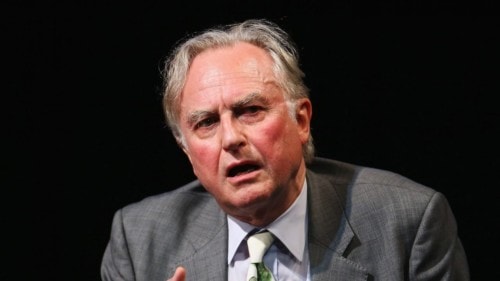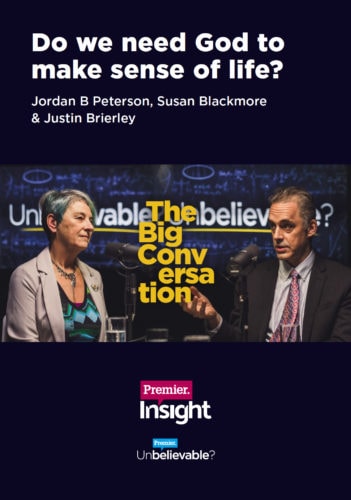
Finding the Great Physician in the Intensive Care Unit?
Posted:Reflecting on the discussion about God, suffering and intensive care on Unbelievable? Medical doctor Erik Strandness asks which worldview makes the most sense of suffering, and what hope is there?
COVID 19 has not only revealed our physical limitations but also exposed our emotional and spiritual vulnerability. Sadly, we all know someone who has either died or become gravely ill from this particularly nasty disease. It appears that medicine has met its match but what about the Great Physician? Where is God’s Rest amongst the labored breathing? Is it possible to hear that still small voice above the cyclical sighs of a ventilator? Can we see God’s heart in a cardiac monitor that has flat lined?
Unbelievable? gave us the opportunity to explore these questions from an insider’s perspective by presenting a thought-provoking discussion between atheist intensive care nurse Dean Mayes and apologist Dan Paterson. It was a fascinating discussion because it gave us a peek into the mind of one who cares for casualties on the frontlines of perhaps the Gospels most contested battlefield, the problem of suffering. As Mayes well knows, one of best places to test competing worldviews is in the intensive care laboratory, so which one fares better, Atheism or Christianity?
The Battle is On
I scan the horizon from my Intensive Care Nursery watchtower monitoring the enemy. I see the glow of their campfires in the distance. I see their flags, emblazoned with the silhouette of Darwin’s face, relentlessly flapping in the breeze. I hear the chant of their battle cry, “Survival of the fittest!, Survival of the fittest!” echoing through the valley of death. I know the armies of natural selection are out there waiting for their opportunity to attack. I inspect the battlefield looking for the weak, helpless, and unfit. The battle horn sounds. A woman is delivering an extremely premature baby at the borderline of viability. We wheel out our ventilators and incubators like cannons being brought to the frontlines to do battle. I have my infantry of nurses and respiratory therapists armed with catheters, tubes, and medications. The baby is delivered. I wield my endotracheal tube like a sword and establish an airway. The battle is on! (Strandness)
As a neonatologist, I battle evolution every day. Guess what? You pay me to do it and then sue me when it doesn’t go well. I help empower the genetically inferior to survive by outfitting them with the latest technology: gastrostomy feeding tubes, tracheostomies, wheelchairs, and ventriculo-peritoneal shunts, and then send them to outposts, such as Shriner’s hospital and the Guild school, where they continue to skirmish with their evolutionary enemy. If you adhere to a strictly Neo-Darwinian evolutionary explanation of life and still admire the job I do, then you had best rethink your view of evolution because you can’t have it both ways. You can’t pay homage to your evolutionary king and then fund the insurrection.
Worldview Laboratory
“In a universe of blind physical forces and genetic replication some people are going to get hurt, other people are going to get lucky, and you won’t find any rhyme or reason in it, nor any justice. The universe we observe has precisely the properties we would expect if there were, at the bottom, no design, no purpose, no evil and no other good. Nothing but blind pitiless indifference. DNA neither knows or cares. DNA just is. And we dance to its music.” (Richard Dawkins – The Blind Watchmaker)

You may not like Dawkin’s brutal distillation of the atheist worldview, but you must admire his courage for so clearly spelling out such an inconvenient truth. It can be argued that we may not like evolution, but that doesn’t stop it from being true. As Christopher Hitchens suggested.
“We must also confront the fact that evolution is, as well as smarter than we are, infinitely more callous and cruel, and also capricious.” (Christopher Hitchens- God is Not Great)
While this seems a rather bleak view of the world, we still need to ask if Christianity’s talk of an afterlife with no more tears does a better job?
Deaf, Dumb and Blind
It’s easy for a scientist in his or her sterile laboratory of test tubes and chemicals to argue for a strictly Neo-Darwinian evolutionary mechanism for life, but it is a completely different situation to hold a dying baby in your arms and conclude that they were evolutionarily unfit. Thankfully nobody is that cruel. All of us would offer emotional support, a listening ear, and a kind word, but we do so not because we are a monkey’s uncle but because we bear a divine image.
In the NICU, the evolutionarily “challenged” have first names. They are loved by their parents and caretakers. We celebrate their healing and mourn their loss. One very important distinction between these worldviews is that the God of Christianity loves all evolutionary dead ends, while the Blind Watchmaker considers them collateral damage in the struggle to be the most fit survivor. A Blind Watchmaker may make for a convenient materialist designer avatar but his apparent lack of concern for those who suffer means that he is also deaf to our cries and unable to speak words of comfort. As it turns out, the deaf, dumb, and Blind Watchmaker does indeed play a very mean pinball with human life.
Bench to Bedside
As a neonatologist, I can relate to the experience Mayes brings to the table. I too have struggled to understand pain, suffering and death in the intensive care unit. Why do bad things happen to good people? Why do parents of faith who diligently pray still lose a beloved child? My experiences, however, haven’t diminished my faith but made it stronger. Why?
One of the mantras of medical research is, “bench to bedside,” the need for the findings of laboratory research to be relevant to the actual care of patients. Sometimes it works and sometimes it doesn’t. In a previous blog, I explained why Neo-Darwinian evolutionary theory is of no scientific use to me at the bedside because the mutations of evolutionary progress just fills my unit with babies with genetic diseases and natural selection, rather than being my medical assistant, turns out to be my worst enemy.
Mayes recognizes that when science has met its match in the terminally ill the only thing he has left to offer is a touch, a kind word, or hope for something better. We know where medical technology comes from but where does this compassion come from? We touch because His hands have already been pierced, we offer words of encouragement to the world-weary because He said He had overcome the world, and we offer hope of an afterlife because at the point of death He told us that we would be with Him in paradise. It’s interesting that medicine has limits but compassion doesn’t. Spoken or unspoken, contemplating the end of physical life conjures up thoughts of the spiritual and if we fail to address these concerns with our patients then we are guilty of medical malpractice.
Atheists consider faith to be a psychological defense mechanism to protect us from our fear of death but what if it was an open invitation to even more life? Atheists believe that religion is just an evolutionary spandrel but why, for those in the ICU, does it feel more like a load bearing wall?
Divine Punching Bag
I find it interesting that suffering elicits anger from both believer and unbeliever alike, and that anger is usually directed at God. Deep down we all believe that someone must pay for what Paterson called the, “wrongness of suffering.” However, if DNA neither knows nor cares why all the anger? The atheist may want to focus on the cruelty of the God of the Bible but the blind watchmaker doesn’t get diplomatic immunity just because he is sensory impaired. It often seems that instead of addressing the cruel practices of their materialist maker they prefer to make the God they don’t believe in into a punching bag. Anger at God for allowing suffering is an appropriate topic for a Christian, and I appreciate the atheist’s willingness to keep our feet to the fire, but it seems a waste of time for a materialist if life is nothing but a DNA dance party.
“The Christian story actually answers beautifully that deep intuition that this is not the way things should be, that something has gone wrong.” (Dan Paterson)
Interestingly, the punching bag that they make of God is answered by a God who enters the ring and goes down for the count. The anger they have towards a God who allows individual suffering is answered by a God who corporately takes it on. You cannot look Jesus in the eye and say, “you don’t understand!”
It is said of God that no one can behold his face and live. I always thought this meant that no one could see his splendor and live. A friend said perhaps it meant that no one could see his sorrow and live. Or perhaps his sorrow is splendor. (Nicholas Wolterstorff)
Omnisuffering
Christians are frequently criticized for believing in a God that allows, or even promotes, evil, pain, and suffering. The critics make the case that the attributes of God are inconsistent with the presence of evil in the world. How can we believe in an omnipotent, omniscient, and omnibenevolent God when pain and suffering are so omnipresent? The problem is we have been coerced into defending a God that we don’t actually believe in. The divine Omni’s can be helpful when describing the character of God but we need to remember that the God of the Bible is also omnisuffering.
In what respects do we mirror God? In our knowledge. In our love. In our justice. In our sociality. In our creativity. These are the answers the Christian tradition offers us. One answer rarely finds its way onto the list: in our suffering. Perhaps the thought is too appalling. Do we also mirror God in suffering? Are we to mirror him ever more closely in suffering? Was it meant that we should be icons in suffering? Is it our glory to suffer? (Nicholas Wolterstorff)
We worship a God who entered a world of pain and suffering. A God who took on all (omni) the sin of the world to restore the broken relationship with those created in His image, therefore, when our critics try to pin us to the wall with the problem of evil we need to show them that our God has already been nailed there. The very complaint they try to prick our conscience with has already been pierced by a spear. If Jesus is the true image of God then we cannot neglect the fact that He is also a suffering servant. Drinking from the bitter cup Jesus performs another miracle and transforms it into living water.
What other religion or philosophy can claim that the object of their devotion suffered on their behalf?
I believe Christianity has the answer to suffering and death, so what we really need to do is turn the tables and ask our critics why pain and evil exists in their world, and if they say there is no God, then we need to ask them why they even care.
“If it comes down to facing suffering in a world where there is no hope, that death does really rob us of any ultimate hope, and where suffering gets the last word, and where there is no ultimate meaning to our suffering…Well, I would much rather suffer with Jesus than suffer without Him.” (Dan Paterson)
Quotes from Nicholas Wolterstorff comes from his book Lament for a Son.
Erik Strandness is a physician and Christian apologist who has practiced neonatal medicine for more than 20 years.
Watch the discussion between Dean Myers and Dan Paterson
